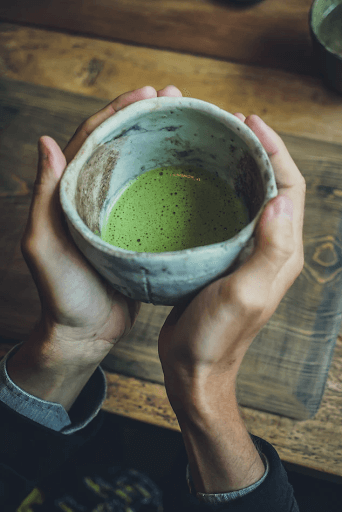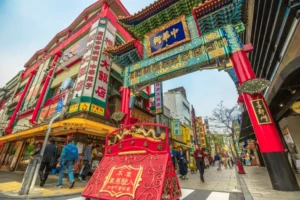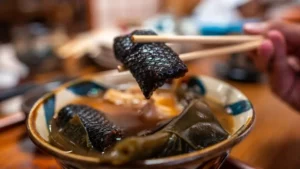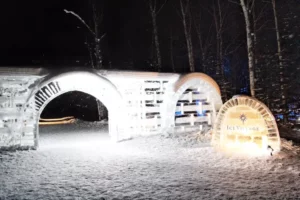It’s no secret that matcha green tea is one of Japan’s most popular exports – but with such complex traditions, it can be difficult to learn how to make matcha easily from home.
Table of Contents
ToggleWhat Is Matcha?
Unlike other green teas, matcha is a fine powder produced by drying and grinding specially cultivated tea leaves, thereby conserving all of the leaves’ nutrients. As a powder, matcha can’t be steeped like other teas and doesn’t dissolve in water. Instead, preparing matcha involves whisking the tea powder and water together until the powder diffuses and suspends, creating a thick, rich foam. The whisking process also introduces air into the water, giving matcha tea its strong, creamy taste.
How Is Matcha Prepared Traditionally?
In Japan, matcha has been prepared and consumed in traditional tea ceremonies since the 14th century. Making matcha green tea the traditional way involves the use of special equipment, including a tea scoop, bowl, and bamboo whisk called a chasen. The chasen is particularly important because it stops the tea powder from clumping together during preparation.
With a minimum of 16 separate bristles, and often as many as 120, the chasen is much more effective at diffusing the matcha powder in water than a regular whisk. The bristles can also bend to fit the curve of any tea bowl, ensuring nothing is left on the sides, and all the powder is well mixed for a smooth drink.
How To Make Matcha Tea Without a Whisk
Of course, it can be difficult to obtain and learn to use a chasen correctly. They also require proper cleaning, care and storage after use.
Luckily, there are plenty of ways to make matcha without a whisk—and without sacrificing any of that rich, creamy flavor! These methods use common household items and appliances, and most will work with whatever kind of matcha drink you’re trying to whip up, whether iced matcha, blended smoothie, or a simple cup of matcha tea.
Make sure your matcha powder doesn’t go to waste by checking out these 4 simple methods for making matcha tea without a whisk!
The Shaking Method
The shaking method is one of the most common and easiest methods for making matcha without a bamboo whisk. It’s also one of the only methods that doesn’t rely on any electrical appliances, making it ideal for satisfying those green tea cravings when you’re on the go!
Sakuraco’s traditional Japanese snack box includes authentic Japanese teas in every box, including matcha and hojicha!

All you need is a container with a tight seal, like a mason jar or an empty drinking bottle. Simply add the matcha powder to the container along with the appropriate portion of water or milk, seal it closed, and shake until a thick froth has formed. Sifting the powder into the container first will further reduce the chance of any stubborn clumps surviving the shaking process.
This method is particularly effective for cold matcha drinks, like iced matcha lattes and cold brew matcha. That said, it can also be used for making hot tea—just make sure to use a heat-proof container or dedicated thermos to avoid any accidents!
Using a Blender
For people with access to basic kitchen appliances who don’t need to make their matcha on the go, this is a great option. Rather than shaking the matcha yourself, let a blender do all the hard work! A small, powerful blender will usually work better here, but any size or strength will do. You’ll know you’re done when you’ve got a smooth liquid with a thick froth on the surface and no visible lumping.
Needless to say, the blender method is an especially convenient choice if you’re looking to whip up a thicker matcha drink, like a milkshake or a smoothie. To ensure a silky finish, many smoothie recipes will recommend whisking the matcha tea separately before blending it with any other ingredients, and the blender method makes this all too easy to achieve by simply splitting the process into two separate blending stages.
Using a Milk Frother
Finally, you can also use a handheld or electric milk frother to prepare the perfect matcha drink. Simply add the matcha powder and the hot water or milk to your cup of choice, froth it up in the usual way, and you’re good to go!
In some ways, using a handheld milk frother most closely resembles the actual process of whisking matcha with a traditional bamboo whisk. However, unlike a whisk, handheld milk frothers have a rigid frame and might leave some matcha powder stuck to the sides of your cup. On the flip side, it’s incredibly easy to re-froth your drink if the powder begins to settle or the matcha just hasn’t quite reached that perfect, foamy consistency.
If you’ve been waiting to get into matcha green tea, it’s never been easier or more convenient. With so many different drinks, health benefits, and easy preparation methods, there’s really no excuse not to give matcha a try!









